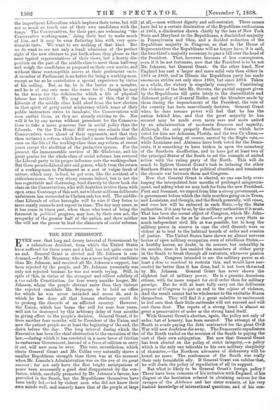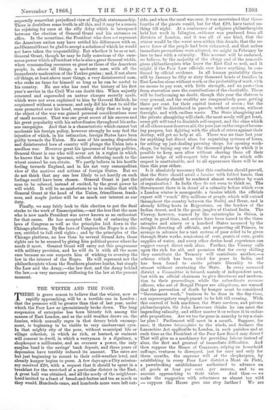THE NEW PRESIDENT. E VEN now, that long and dreary interval
of Government by a calamitous Accident, from which the United States have suffered for three years and a half, has not quite come to an end. General Grant is elected and Mr. Johnson is con- demned,—for Mr. Seymour, who was a more hopeful candidate than Mr. Johnson, and received all Mr. Johnson's support, has been rejected by the people, and Mr. Johnson personally was only not rejected because he was not worth trying. Still, in spite of this, in virtue of the strangest and silliest subtlety of a too subtle Constitution, for four weary months longer, Mr. Johnson, whom the people distrust more than they distrust the rejected candidate Mr. Seymour, is to hold an office for which he was never intended and never fit, and in which he has done all that human obstinacy could do to prolong the discords of an afflicted country. However, the Union, which has borne the evil for near four years, will not be destroyed by this arbitrary delay of four months in giving effect to the people's decision. General Grant, if he lives another four months, will be President of the Union, and now the patient people see at least the beginning of the end, the dawn before the day. The long interval during which the Executive has been the chief obstruction to the execution of the law,—during which it has consisted in a mere force of friction to embarrass Government, instead of a force of volition to carry it out, will now soon be over. The vote, nevertheless, which elects General Grant and Mr. Colfax very naturally shows a smaller Republican strength than there was at the moment when Mr. Lincoln's Administration was on the eve of its great success ; for not only have the first bright anticipations of peace been necessarily a good deal disappointed by the con- fusion, which, carefully promoted by Mr. Johnson's favour, has prevailed in the South, but the Republicans themselves have been badly led,—led by violent men who did not know their Aiwa minds well, and scarcely knew that of the people at large at all,—men without dignity and self-restraint. These causes have led to a certain diminution of the Republican enthusiasm of 1864, a diminution shown chiefly by the loss of New York State and Maryland to the Republicans, a diminished majority in Pennsylvania and Ohio, and a decided reduction of the. Republican majority in Congress, so that in the House of Representatives the Republicans will no longer have, it is said, the two-third's majority necessary to pass a bill over the head of the President. That, however, becomes of less consequence, even if it be not fortunate, now that the President is to be not Mr. Johnson, but General Grant. On the other hand, New England has cast a larger and more solid vote than either in, 1864 or 1860, and in Illinois the Republican party has made. enormous strides not only since 1860, but since 1864. Taken as a whole, the victory is singularly complete. Considering the violence of the late Mr. Stevens, the partial support given by the Republicans till quite lately to the discreditable and dishonest policy of General Butler, and the blunders made by them during the impeachment of the President, the vote of the country has been marvellously decisive. General Grant. when he does assume power will feel that he has the nation behind him, and that the great majority he has- secured may be made even more sure and more united by an administration of moderate firmness and sagacity. Although the only properly Southern States which have- voted for him are Arkansas, Florida, and the two Carolinas,— South Carolina being, of course, carried by the Negto vote,— while Louisiana and Alabama have both voted for the Demo- crats, it is something to have broken in upon the monotony of the Southern disaffection, and to have got at least two of the principal States of the South to set the example of united action with the ruling party of the North. This will do, much to lighten General Grant's task in inducing the other- Southern States to accept the political situation and terminate- the chronic war between them and Congress.
Now that General Grant is elected, no one can help over- leaping the interpolated four months of prolonged misgovern- ment, and asking what we may look for from the new President.- First and foremost, we expect from him a strong government,— a government before which the daily murders going on in Texas, and Louisiana, and Georgia, and the South generally, will eease, and some law will be enforced in each State,—by the Stater authorities, if it may be so, by the military authorities if it must.. That has been the recent object of Congress, which Mr. John- son has defeated so far as he dared,—to give every State as, much independent civil life as was possible, but to keep the- military power in reserve in case the civil discords were so, violent as to lead to the habitual breach of order and evasion of justice. The United States have shown an almost nervous- horror of open military occupation even of rebellious States,— a healthy horror, no doubt, in its sources, but unhealthy in its results, since it has enabled the members of either party in the South to break through all restraints, whenever passion ran high. Congress intended to use the military power as at. least a deus ex machind to restrain this, and would have suc- ceeded far better than it has done, had it not been thwarted by Mr. Johnson. General Grant has never shown the- slightest lust of military power. He is a genuine American citizen, with far more respect for civil order than for military- prestige. But he will at least fully carry out the deliberate- purpose of Congress to put an end to the re'gime of violence,. And the result cannot but be wholesome to the excitable States. themselves. They will find it a great sedative to excitement. to feel sure that their little outbreaks will not succeed and with cost them dear. The repute of a strong hand is almost as, great a preservative of order as the strong hand itself. With General Grant's election, again, the policy not only or order, but of honesty, has been secured. The attempt of the.. South to evade paying the debt contracted for the great Civik War will now doubtless die away. The Democratic repudiators- of the North traded on the aversion of the South to paying the' cost of their own subjugation. But now that General Grant, has been elected on the policy of strict integrity,—a which is the only one tolerable to his own military simplicity of character,—the Northern advocates of dishonesty will be heard no more. The restlessness of the South was really their only formidable ally. If General Grant can subdue that,. he will drain the policy of repudiation of all its support.
But what is likely to be General Grant's foreign policy r There have been rumours of his irritation with England, of his disgust at the hesitation evinced in obtaining redress for the ravages of the Alabama and her sister cruisers, of his very limited knowledge of international questions, and of his eon..
sequently somewhat prejudiced view of English statesmanship. There is doubtless some truth in all this, and it may be a reason for rejoicing for once at the silly delay which is interposed between the election of General Grant and his entrance on office. In the meantime, the President who does not represent the American nation may have settled his differences with us, and General Grant be glad to accept a solution of which he would not have taken the responsibility. But whether it be so or not, General Grant, though he may be fully conscious of the enor- mous power which a President who is also a great General wields, when commanding resources so great as those of the American people, is, above all things, a moderate man, with all the immoderate moderation of the Yankee genius ; and, if not above all things, at least above most things, a very disinterested man, who seeks no fame for himself so long as he can be useful to his country. No one who has read the history of his first year's service in the Civil War can doubt this. When unjustly censured and superseded on untrue charges secretly made, which were not even explained to him by General Halleck, he acquiesced without a murmur, and only did his best to aid the man promoted over his head, remarking drily that so long as the object of the war was gained personal considerations were of small account. That was one great secret of his success and his great popularity with his subordinates throughout his ardu- ous campaigns. And that is a characteristic which cannot but moderate his foreign policy, however strongly he may feel the injustice of which, in his estimation, foreign States have been guilty towards the Union. No man of his musing disposition and disinterested love of country will plunge the Union into a needless war. However great his ignorance of foreign politics, General Grant is one who will never act in a region in which he knows that he is ignorant, without deferring much to the wisest counsel he can obtain. We partly believe in his hostile feeling towards England, and in his not very cosmopolitan view of the motives and actions of foreign States. But we do not think that any one less likely to act hastily on such feelings could have been chosen. General Grant is just the man to be sobered, instead of excited, by the great power he will wield. It will be no misfortune to us to realize that with General Grant at the head of the Union, friendliness, frank- ness, and ample justice will be as much our interest as our duty.
Finally, we may fairly look to this election to put the final stroke to the work of Emancipation,—not the less that the man who is now made President was never known as an enthusiast for that cause. He has accepted the task of enforcing the laws of Congress as well as the principles laid down in the Chicago platform. By the laws of Congress the Negro is a citi- zen, entitled to full civil rights ; and by the principles of the Chicago platform, no less than by several formal Acts, those rights are to be secured by giving him political power where he needs it most. General Grant will carry out this programme with military precision, and he will do it with all the more ease because no one suspects him of wishing to overstep the law in the interest of the Negro. He will represent not the philanthropists whom the Southern planters loathe, but simply the Law and the Army,—the law first, and the Army behind the law,—a very necessary stiffening for the law at the present moment.































 Previous page
Previous page